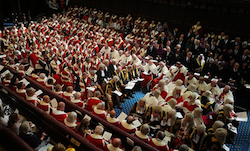The government’s Bill to remove hereditary peers from the House of Lords is a welcome start on constitutional change, says CHRIS WILSON. But much more is needed for the UK to be a truly modern democracy.
It is sometimes said that there is no difference between the main parties. The foolishness of that statement is easily exposed by the new Labour government’s proposal to remove the remaining 92 hereditary peers from the House of Lords.
 Here is a Labour difference, and it should be celebrated. It is long overdue – the first shake-up of the Lords for 25 years – but still a deeply significant and welcome reform. Other than the UK, only Lesotho retains a hereditary element in its legislature.
Here is a Labour difference, and it should be celebrated. It is long overdue – the first shake-up of the Lords for 25 years – but still a deeply significant and welcome reform. Other than the UK, only Lesotho retains a hereditary element in its legislature.
The government’s House of Lords (Hereditary Peers) Bill will amend the existing legislation, passed by Tony Blair’s government in 1999, and remove the right of the remaining hereditary peers to sit and vote. Introduced in the House of Commons on 5 September, it is now at the second reading stage and should come into effect in 2025.
The Bill will partially fulfil one of Labour’s important manifesto commitments – partially, because the party’s proposal that all Lords should retire at 80 has now gone out to consultation. The current average age of hereditary peers, by the way, is 70. What’s more, none of them are women and all are white.
Current members of the House of Lords can claim £342 in daily allowance (the Lord Speaker earns a salary of £106,363), so maybe there will be modest financial saving as well.
The legislation is also, perhaps, a helpful staging post towards the ultimate aim of replacing the Lords with an assembly of nations and regions – a worthy goal, although one at present lacking details or a timeline.
However, there are some glaring democratic shortcomings that this Bill does nothing to address. First, the House of Lords is still too large – some 800 members, as opposed to 650 MPs in the House of Commons.
It is also unbalanced, politically – there are 277 Tory peers to 185 Labour members and 183 crossbenchers. Such bias is even more pronounced among hereditary peers with 42 Tories, 28 crossbenchers, three Liberal Democrats, and only two Labour members.
More importantly, the Bill avoids the whole question of hereditary titles, which can still be passed on through the family line. Knighthoods, OBEs and other honours cannot be transferred to children, so why should we still allow peers to pass on their privilege, even if those who benefit can no longer vote?
Church & state
And then there’s the question of the Lords Spiritual – the 26 Lords, all English Anglicans, whose position in the UK’s second chamber is entirely due to their faith.
 I am a Christian socialist, and believe faith communities have an important role to play in ‘speaking truth to power’. But how can they do this when they are the power that needs speaking to?
I am a Christian socialist, and believe faith communities have an important role to play in ‘speaking truth to power’. But how can they do this when they are the power that needs speaking to?
This privileged position within our legislature for religious figureheads cannot be reconciled with a modern democracy. This is especially so, given that retired bishops can sit as life peers along with those of others faiths and none, something I have no objection to.
Simply put, it is not acceptable for someone to gain membership of a legislating body based merely on their faith, as opposed to their proven contribution to society.
It is worth noting that previous attempts to reduce the numbers of the Lords Spiritual have failed. In 2011, for example, there was an attempt to cut the numbers from 26 to 12. The only reform that was successful came in 2015 when the Lords Spiritual (Women) Act modestly increased the numbers of women.
It is not more women that is need here; it is more democracy. And while we retain an appointed House, we also need greater fairness in the appointments system.
The proportion of people in the UK who identify as Anglican has fallen from 40% in 1983 to 12% in 2018, while only 1.2% attend Church of England services regularly.
It is true, some 27.5 million of us still self-define as Christian. But to seek political privilege on the basis of a single tradition, in what is now a multifaith and multicultural country of diverse nations and regions, is deeply problematic.
So the Labour government is to be commended for reforming the House of Lords, and for partially fulfilling a manifesto commitment. Of course, there are many wider constitutional questions, and the time to tackle those will come. Reform, by its nature, is incremental.
I can only hope the next steps in Lords reform will tackle the question of hereditary titles and introduce a formal separation of church and state within our legislature.
—-
Reverend Chris Wilson is a church minister, an active trade unionist and a Christian socialist.
This is the first in a series of articles on the new Labour government’s legislative programme.


